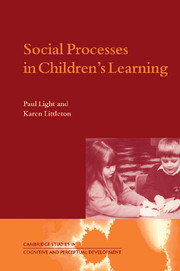Book contents
- Frontmatter
- Contents
- List of figures
- Preface
- Acknowledgements
- 1 Peer interaction and learning: perspectives and starting points
- 2 Peers and puzzles: a first series of studies
- 3 Computers and learning
- 4 Kings, Crowns and Honeybears: a second series of studies
- 5 Gender agendas
- 6 Social comparison and learning
- 7 Interaction and learning: rethinking the issues
- References
- Index
- Cambridge Studies in Cognitive and Perceptual Development
4 - Kings, Crowns and Honeybears: a second series of studies
Published online by Cambridge University Press: 22 September 2009
- Frontmatter
- Contents
- List of figures
- Preface
- Acknowledgements
- 1 Peer interaction and learning: perspectives and starting points
- 2 Peers and puzzles: a first series of studies
- 3 Computers and learning
- 4 Kings, Crowns and Honeybears: a second series of studies
- 5 Gender agendas
- 6 Social comparison and learning
- 7 Interaction and learning: rethinking the issues
- References
- Index
- Cambridge Studies in Cognitive and Perceptual Development
Summary
Introduction
In this chapter we shall describe a series of experimental studies based on the collaborative use of computer-based planning tasks. The studies are linked by the particular type of task used. Rather than start from existing tasks, as in the first series of studies (Chapter 2), we decided to develop our own. Instead of relying on computer simulations of non-computer tasks, such as the Tower of Hanoi or the balance beam, we wanted to develop a task which would better exploit the potential of the computer. We also wanted a task which would allow a more extended experience of solo or collaborative problem solving, rather than a sequence of quick trials.
We were interested by evidence from Rogoff and colleagues (Gauvain and Rogoff, 1989; Radziszewska and Rogoff, 1988) that the ‘metacognitive’ processes involved in successful planning (e.g. conscious, explicit monitoring and careful control of plan development) might lend themselves particularly well to facilitation through interaction, discussion and collaboration. We were also aware of evidence that ‘adventure games’ seemed to offer particularly stimulating contexts for peer discussion and interaction (Crook, 1987; Johnson and Johnson, 1986).
The task we designed lies somewhere along a continuum running from genuinely open adventure games to closed logical problems of the Tower of Hanoi type that we had used previously. We wanted a well-structured problem, but one which at the same time offered a variety of routes to solution, some more efficient than others.
- Type
- Chapter
- Information
- Social Processes in Children's Learning , pp. 32 - 51Publisher: Cambridge University PressPrint publication year: 2000

